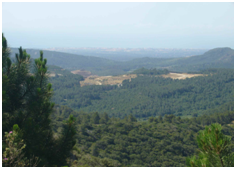
Introduction
The extraction of aggregates and other subsurface minerals as an economic activity generates significant environmental impacts – on the local environment and biodiversity, on the landscape, on traditional economic activities linked to the land, and on the welfare of people living near these activities.
The Baix Camp region of Catalonia is characterised by a high concentration of quarries (Figure 1). In the municipality of Riudecols for example, currently around 3.5% of the municipality is occupied by quarries, with plans to expand activity to cover 11% of the municipality.
The lack of regulation of these activities at the municipal level has meant that very often work is carried out without any license and with the absolute complicity of government departments responsible for environmental control. Moreover, in recent years there has been a clash of interests between these extractive activities and other economic initiatives such as rural tourism, the re-launch of certain agricultural areas, the enhancement of the landscape and the protection of the environment.
Click here for the factsheet (2 pages):FS_031_Baix Camp region

The project ENVJUSTICE has received funding from the European Research Council (ERC) under the European Union’s Horizon 2020 research and innovation programme (grant agreement No. 695446)